
Six Years After: Towards a New Social Contract
An Economic Debate Focused on the World Bank’s new Middle East and North Africa Economic Monitor “Regional Prospects and the Economics of Post-Conflict Reconstruction”
By invitation, Rabat
The World Bank in partnership with the OCP Policy Center announces the launch of the latest edition of the Middle East and North Africa (MENA) Economic Monitor in Rabat, Morocco on April 17, 2017. The report presents the short-term, macroeconomic outlook and economic challenges facing countries in the region. The current outlook has shifted from “cautiously pessimistic” to “cautiously optimistic” as, despite ongoing conflict and instability, the report identifies positive trends such as economic reforms and the stabilization of oil prices that if sustained will lead to higher growth. The latest edition also has a special section on the economics of post-conflict reconstruction. Along with providing an assessment of the economic costs of the conflicts in Libya, Syria and Yemen, the report outlines principles for a reconstruction effort focused not only on replacing infrastructure but on strengthening inclusive institutions.
The conference will consist of two panels; which will be livestreamed in English, French and Arabic on the World Bank and OCP Policy Center websites, and will be broadcast on F24 Arabic on Friday, April 21st, at 4:10 pm Paris time. The panels will be held in Arabic, and translated into French and English.
Panel I: 6 years after the Arab Spring: The Economic Situation in MENA and the Prospects for Growth and Reform
The economies of the MENA region were all – directly or indirectly – impacted by a multitude of factors during the last 6 years: war, violence, political instability and low oil prices. How did all these factors impact economic activity in the region as a whole? How did Arab Spring oil-importing countries (Egypt + Tunisia) perform during this period? Is their economic situation better/worse than before? How did neighboring oil-importing countries react to the changes in the region and how did they perform (example of Morocco)? And how did lower oil prices impact the economic performance of oil exporting countries (GCC + Libya and Algeria)? In view of recent developments, many MENA countries have realized that reforming their economies has become inevitable. Reforms have started in a number of countries, such as Egypt, Tunisia, Morocco, along with oil exporting countries (in particular, GCC countries). The discussion in the first panel will focus on the the current state of economies in the region and the prospects for economic reform. The debate will tackle the major challenges facing the region, such as high youth unemployment and very low female labor market participation, and the policies and reforms needed to address them.
Panel II– The Economics of Post-Conflict Reconstruction in the Region: Towards a New Social Contract
Violence and conflict have contributed to the slow growth in the MENA region over the past 6 years, as the civil wars in Libya, Syria and Yemen have had impacts far beyond their borders. Neighboring countries such as Lebanon and Jordan have coped with a massive influx of refugees, and countries such as Tunisia have had one of their most important sectors, tourism significantly impacted. At the same time, the prospects for peace in Libya, Syria and Yemen and potential recovery and reconstruction remain one of the keys to resuming growth over the next decade. The positive impact of reconstruction, however, depends on how the process is managed. The discussion in the second panel will focus on the principles of reconstruction, and how any potential effort should address the causes of conflict as well as rebuilding critical infrastructure. One of the common causes of all three of the regional civil wars is a breakdown of trust between citizens and their government. This panel will focus on ways to restore that trust and rebuild the social contract between citizens and their government, and the role of any potential reconstruction in that process.
Click here to watch live streaming
Agenda
|
16:45 – 17:00 |
Registration |
|
17:00 – 17:10 |
WELCOMING REMARKS - Karim El Aynaoui, Managing Director, OCP Policy Center |
|
17:10 –17:30 |
PANEL I: 6 YEARS AFTER THE ARAB SPRING: THE ECONOMIC SITUATION IN MENA AND THE PROSPECTS FOR GROWTH AND REFORM MODERATOR Line Rifai, Business Editor, France 24 SPEAKERS - Shanta Devarajan, Middle East and North Africa Chief Economist, World Bank |
|
17:30 –18:00 |
PANEL II: THE ECONOMICS OF POST-CONFLICT RECONSTRUCTION IN THE REGION: TOWARDS A NEW SOCIAL CONTRACT MODERATOR Line Rifai, Business Editor, France 24 SPEAKERS - Shanta Devarajan, Middle East and North Africa Chief Economist, World Bank |
|
18:00 –18:20 |
Discussion |
|
18:20 –18:30 |
CONCLUDING REMARKS |
-
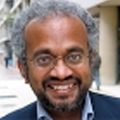
Shanta Devarajan
Middle East and North Africa Chief Economist, World Bank
Shantayanan Devarajan is the Chief Economist of the World Bank’s Middle East and North Africa Region. Since joining the World Bank in 1991, he has been a Principal Economist and Research Manager for Public Economics in the Development Research Group, and the Chief Economist of the Human Development Network, South Asia, and Africa Region. He was the director of the World Development Report 2004, Making Services Work for Poor People. Before 1991, he was on the faculty of Harvard University’s John F. Kennedy School of Government.
The author or co-author of over 100 publications, Mr. Devarajan’s research covers public economics, trade policy, natural resources and the environment, and general equilibrium modeling of developing countries. Born in Sri Lanka, Mr. Devarajan received his B.A. in mathematics from Princeton University and his Ph.D. in economics from the University of California, Berkeley.
-
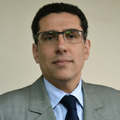
Karim El Aynaoui
Directeur Général, OCP Policy Center
Karim El Aynaoui is currently Managing Director of OCP Policy Center, a think tank based in Rabat. He also serves as advisor to the CEO and Chairman of OCP Group, a global leader in the phosphate sector. From 2005 to 2012, he worked at Bank Al-Maghrib, the Central Bank of Morocco. He was the Director of Economics and International Relations, where he provided strategic leadership in defining and supporting monetary policy analysis and strategy. He was also in charge of the Statistical and International Relations Divisions of the Central Bank, led the research division and was a member of the Governor’s Cabinet. Before joining Bank Al-Maghrib, Karim El Aynaoui worked for eight years at the World Bank, both in its Middle Eastern and North Africa, and Africa regions as an economist.
He has published papers, books and articles in scientific journals on macroeconomic issues in developing countries. Recently, he co-authored a book outlining a growth strategy for Morocco and was the guest editor of a special issue on food price volatility in Oxford Economic Papers. Karim El Aynaoui is a board member of the OCP Foundation, member of the Strategic Advisory Board of the French Institute of International Relations (IFRI) and member of the COP22 Scientific Committee. He is also member of the Malabo Montpellier Panel, a group of leading African and European experts from the fields of agriculture, ecology, nutrition, public policy and global development. He holds a PhD in economics from the University of Bordeaux, where he taught for three years courses in statistics and economics.
-
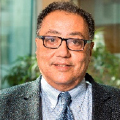
Hafez Ghanem
Middle East and North Africa Vice President, World Bank
Hafez Ghanem, an Egyptian and French national, is the Vice President of the World Bank for the Middle East and North Africa since March 2, 2015. He is a development expert with more than thirty years of experience in policy analysis, project formulation and supervision, and management of multinational institutions. Dr. Ghanem leads the World Bank’s engagement with 20 Middle East and North African countries through a portfolio of ongoing projects, technical assistance and grants worth more than US$13 billion. Eradicating extreme poverty and promoting shared prosperity through the creation of opportunities are core to his vision for the Middle East and North Africa Region.
Prior to his appointment as Vice President, Dr. Ghanem was a Senior Fellow at the Brookings Institution in the Global Economy and Development program leading the Arab economies project, focused on the impact of political transition on Arab economic development.
Between 2007 and 2012, he served as the Assistant Director-General at the Food and Agriculture Organization of the United Nations (FAO). Thus, he was responsible for the Economic and Social Development Department and FAO’s analytical work on agricultural economics and food security, trade and markets, gender and equity, and statistics. In this role he and his counterpart in OECD coordinated the preparation of the International Organizations’ recommendations to the 2011 G20 meeting on how to respond the global food crisis. He also led the reforms of the Committee on World Food Security to make it more inclusive and responsive to country needs.
Dr. Ghanem returns to the World Bank where he had already 24 years’ experience (1983-2007), and has worked on Bank operations and initiatives in over 20 countries in Africa, Europe and Central Asia, Middle East and North Africa, and Southeast Asia. His previous positions at the World Bank include: Country Director for Nigeria where he led a multinational team of more than 100 professionals, managing the Bank’s loan portfolio of some USD 1.5 billion; Country Director for Madagascar, Comoros, Mauritius and Seychelles; and Sector Leader for Public Economics and Trade Policy in the Europe and Central Asia Region. Dr. Ghanem joined the World Bank in 1983 as a Young Professional and worked as a research economist before moving on to senior economist roles in West Africa and South Asia.
He has many publications in professional journals and was a member of the core team that produced the World Bank’s 1995 World Development Report.
He holds a bachelor’s and master’s degree in Economics from the American University in Cairo and a PhD in Economics from the University of California, Davis. He is fluent in Arabic, English and French.
-
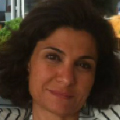
Massa Mufti-Hamwi
Co-founder and Chair, Sonbola Group for Education and Development
Over the past 22 years, Massa Mufti has accumulated a substantive depth of diversified knowledge and experience in the field of Education and Learning across educational institutions in the United States of America, Lebanon and Syria.
Massa is currently highly engaged in Syrian civil society and in supporting Syrian refugees in the field of Education. She is the co-founder and Chair of Sonbola Group For Education & Development (SONBOLA), an NGO that provides quality education for Syrian refugee children in Lebanon with special focus on innovation and skills. Massa is also a consultant at ESCWA on Education for Syria and has been involved in various consultancy projects relating to education management and development as well as in research projects that address Emergency Education, Non-Formal Education, Interactive and Museum-based Learning, Citizenship Education and more.
She was the Chair of the Steering Committee (2011-2012) of MENIT, the GIZ funded initiative of Middle East Network for Innovative Teaching and Learning (www.menit.me).
In addition to two Masters Degrees one in French Literature (Catholic University of America, DC), the other in Education Policies and Leadership (AUB), Massa has a certified training in Education in Emergencies-INEE (Beirut, 2013), a certificate in Business Development (CISCO-British Council, Beirut, 2012), Certified training on Executive Management and Leadership from Harvard Business School (2011), and certified training in Public Speaking (London, 2011), and a certified training on Situational Leadership (Damascus,2010).
She has recently spoke about Syria Education Crisis at one of the UN General Assembly panels in NY (Sept 21, 2016), and has spoken at the UK CSO and Donors Conference on Syria (Feb 3-4, 2016; She spoke also about the role of civil society in peace building at the UN-Global Compact Business For Peace in Dubai (Oct, 2016). She is a regular speaker at NAMES (North Africa and Middle East Network for Science Museums), and has recently spoken about Education at Time of Conflict at NAMES’s recent conference in Amman (Oct 27-28, 2016); Additionally, and among several other conferences, she attended “Teach For All” conference in Puebla, Mexico (Oct, 2014), Global Humanitarian Forum at the United Nations (Dec, 2014), and the World Humanitarian Summit in Istanbul (May 2016) among many others.
-
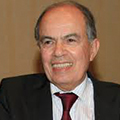
Fathallah Oualalou
Senior Fellow, OCP policy Center, Economist, and Former Ministre of Economy and Finance, of Privatisation and Tourism, Former Mayor, City of Rabat.
Fathallah Oualalou was born in 1942 in Rabat. He graduated in economy from Mohammed V University in 1964 and obtained a diploma on economy in 1966 in Paris. He was appointed Ministry of Economy in 1998 and Ministry of Finance in 2002. He is professor at Mohammed V University and chairs the Association of Moroccan Economists and Union of Arab Economists. After over 20 years as member of the Municipal Council, he was Mayor of Rabat from 2009 to 2015.
-

Line Rifai
Line Rifai, Business Editor, France 24.
-
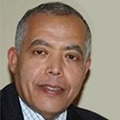
Abdellah Saaf
Abdallah Saaf is a professor of Political sciences at Mohamed V Rabat University, Director of the Center for Studies in Social Sciences Research (CERSS), and Founder of the Moroccan Association of Political Science and Director of Abhath Review. Professor Saaf was a member of the commission in charge of revising the Constitution during July 2011, and member of the Scientific Committee at the Global Forum for Humans rights. Professor Saaf is a former Minister of Education from 1998 to 2004. He also manages an annual publication called “Strategic Report of Morocco” since 1995.









